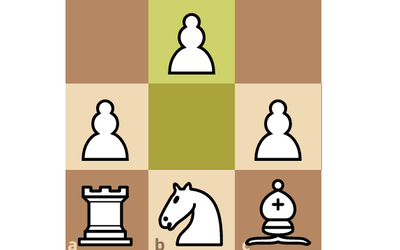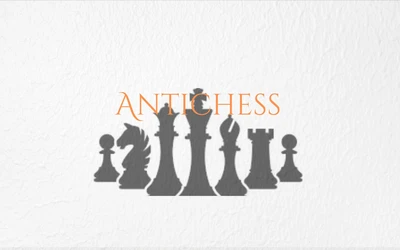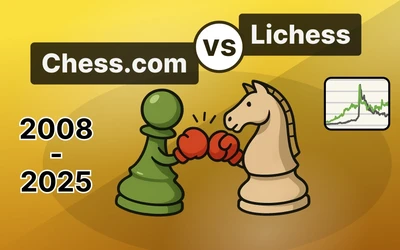
Opening Training for Antichess (and in general)
The following is written from my perspective as an antichess player, but I think most of it applies to standard chess or other variants as well.
Learning openings as a beginner
When I picked up antichess in 2019 I simply threw myself into the hourly arenas on lichess with no sense of how to play at all. You can imagine how much trial and error it took me to even get at least sometimes to the middlegame.
There are just too many opening mistakes you can make, particularly in antichess where a wrong move in the beginning usually means immediate defeat by long forced sequences.
A classic beginner's mistake is, of course, 1. e4, against which every semi experienced player can make white's bishop pick up all their pieces:
The same holds true for 1. d3 or 1. d4. But there are more subtle mistakes as well. In the line below, you won't immediately see why black's second move is already losing. But, with clever use of intermediates, white can again make their opponents bishop clean up their own camp:
I firmly believe that every possible position* after the first 2-3 moves from both sides contains at least one option to go horribly wrong and immediately lose**
(* if it's not a forced move to be played, ** I don't mean in a conceivable way, not in the sense of "there is mate in 125")
However, sticking with antichess, I slowly, painstakingly slowly, picked up on some reasonable opening moves - mostly by checking stockfish after the games, looking for where I went wrong, and swapping the bad move with a good one.
Having thereby learned the correct move in a certain position it unfortunately was quite often days or weeks later when the same position came up again in a game. As a casual player, I usually had already forgotten the move I wanted to employ. Of course, it kind of helped that you usually encounter the same players in the hourly arena, and we don't tend to change our openings too often. This way, the chance to put a new move into practice comes much sooner.
But still. It just takes lots of time to build a stable opening repertoire.
Learning openings as an intermediate player
Later, when I had a better understanding of the game, I sometimes created studies on lichess, and, accompanied by stockfish, started creating my very own opening repertoire. I even wrote a blogpost about my playing of 1. b3 quite some time ago.
Sometimes I took on the engine's suggestion, while at other times I chose a suboptimal move, of which I nonetheless knew from experience that opponents struggle against it. Continuing like this, I even found my own traps. One I was particularly happy to play whenever the chance occured was the following:
Here, black's play is completely natural. But white can, again using two nice intermediates, force a won position.***
(*** It is won if you keep in mind how to respond to all of black's options after move 14, but as you might see if you check the played games from this position I sometimes messed it up)
Practicing then meant simply reviewing the studies from time to time, clicking through the moves, extending them here and there (mostly after a loss).
Often, I found studying the lines quite dull, and only did though as I realized that otherwise I had no chance against the higher rated players.
learning new openings now
After this year's antichess world championship in Amsterdam I realized that my current opening with white (1. b3) is not good enough to compete anymore: opponents got either stronger or simply used to it - it's kind of easy to get into a good middlegame with black if you just stay calm in the beginning. Also, if an opponent who plays 1. e3 e6 2. b4 Bxb4 3. Bd3 encounters my 1.b3, they can simply play
and get a - to them - familiar position and a slight advantage. For a game where white should be winning, this is just not acceptable.
A similar thing bugged me with my black repertoire: 1. e3 c5 often works out well for black, but if white is prepared well they can, for example, force me into ultimately even but tricky positions where the risk is mostly with black.
Maybe stronger players know how to play this from black's side, but I was never really successful.
In the end, not being well educated in more openings meant that opponents can easily prepare against me.
Knowing how long it took me to build and learn my own openings I felt discouraged from switching to other ones. I tried throwing myself into the arenas and played 1. e3, 1. Nh3 with white or 1. e3 b5, 1. e3 e6 with black. Not knowing the ins and outs of the resulting positions I certainly played a couple of hundred points below my rating and even lost several games to the most embarrassing of opening traps.
A shortcut?
Upset that there is no opening app for antichess, I decided to make my own.
At first I wanted to do so only for myself, and hacked together a bit of python code, created a new study on lichess, plugged it into the code, and quickly had a flashcard-like program to practice offline.
This certainly proved much more effective than my previous method with the most significant advantage being that I had to find the correct move in a certain position several times in short succession. Thus, the new moves quickly became second nature and it actually was lots of fun to practice them.
It was like keeping the best part and removing the worst. The quick dopamine rush of finding a correct move or seeing your improvement stayed, and losing games or (certainly very meaningful) rating wasn't a threat any more.
Using my program, I got hooked. Small changes here and there to make it more convenient or effective, and using it every single day, I quickly realized that
- I want to use it on my phone, and
- I want it to be available for the whole community.
I love antichess. Over the years, in particular during covid, it has given me so much pleasure, and I honestly believe that it has lots of potential as a game. The super sharp play straight from the beginning, the too-long-to-calculate forced lines, the queen races, the weird endgames, but that's a topic for another post...
Anyway, I decided to switch from python to Java and try to publish it. It was a long journey but here it is! It's called Preptile, you can get it from the Google Play Store, it's entirely free to use, and in case you want a tutorial, you can find a short one here.
Hopefully it makes antichess (and standard chess?) more accessible to everybody and, most importantly, it's fun to use.
Thank you for reading, I'm open for suggestions of any kind (which other variant shall I implement next?) and sincerely hope this app proves of any worth to you.
You may also like
 drooksh
drookshThe benefits of b3 in antichess
Though probably not the best opening with white, I'd deeply recommend to try b3, especially for begi… CM HGabor
CM HGaborHow titled players lie to you
This post is a word of warning for the average club player. As the chess world is becoming increasin… firebatprime
firebatprimefbp's Guide to Antichess
-Antichess guide- ChessMonitor_Stats
ChessMonitor_Stats